Trending Now
We have updated our Privacy Policy and Terms of Use for Eurasia Group and its affiliates, including GZERO Media, to clarify the types of data we collect, how we collect it, how we use data and with whom we share data. By using our website you consent to our Terms and Conditions and Privacy Policy, including the transfer of your personal data to the United States from your country of residence, and our use of cookies described in our Cookie Policy.
{{ subpage.title }}
The US couldn’t have won in Afghanistan - but Biden’s mistakes lost US credibility
In a Wall Street Journal op-ed, former National Security Adviser H.R. McMaster and Bradley Bowman of the Foundation for Defense of Democracies argue that maintaining US military, financial, and political support in Afghanistan could have staved off a Taliban takeover. Ian Bremmer and Eurasia Group analyst Charles Dunst take out the Red Pen to break down why staying in Afghanistan is not a reasonable option.
I'm sure it comes as no surprise that this week we're taking our red pen to an op-ed about Afghanistan and the heartbreaking, and frankly infuriating images we've seen coming from that country as the Taliban took control.
It is impossible to argue that what we're witnessing isn't a disaster and an epically bad ending to America's longest war in history. But there are some robust debates in the foreign policy and defense community about whether or not a continued US military presence after so much blood and treasure were already lost could have ultimately led to a different outcome in the country.
Case in point: A jointly written Wall Street Journal piece by former National Security Adviser H.R. McMaster and Bradley Bowman of the Foundation for Defense of Democracies. The two argue that maintaining US military, financial, and political support for the Afghan government and security forces could have staved off a Taliban takeover and that Biden's actions have made America less safe. We disagree.
Let's get out the Red Pen.
So point one, McMaster and Bowman dismiss characterizations of the American campaign in Afghanistan as a "costly forever war," pointing out that when Biden decided to withdraw, there were no more than 3,500 US troops left in Afghanistan, and not a single American soldier had been killed in combat in over a year.
This is true. It's a very important point. This was not the war the US was fighting when they had 120,000 troops on the ground with NATO, but it was also a war that was being lost. Lots of Afghans were losing their lives, and they, the Afghan defense forces, were losing territory to an emboldened and stronger than ever, since 9/11, Taliban. The existing US presence as it stood was not sustainable, especially when the ceasefire with the Taliban was set to end in May. It was either expand the NATO footprint or leave. I think if you could have made the argument that you could maintain the existing presence and it would be sustainable ongoing, very different discussion we are having here.
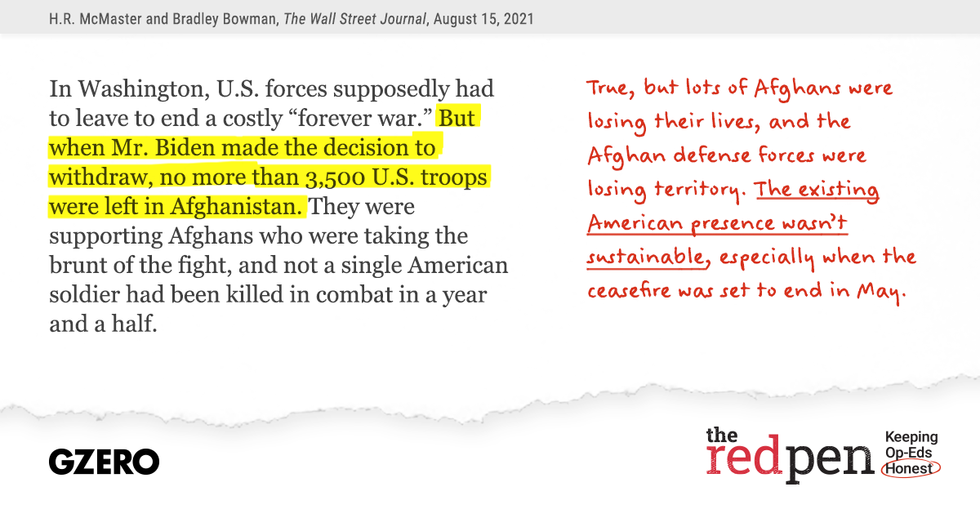
Point two, they say that "the idea that the Taliban is concerned about its reputation in New York or Geneva would be laughable if the circumstances weren't so grim."
Certainly, agree on New York and Geneva, Taliban leaders won't cozy up to Washington or Brussels any time soon. But I do want to say, that doesn't mean they aren't concerned about their international image. There's a reason why the Taliban took over the country without inflicting needless bloodshed, why they're giving interviews to CNN and even female Afghan journalists, why they're saying that Afghan women will have the right to work and be educated up to university level, and why they reached a "deconfliction mechanism" with the US to allow American officials and even some Afghans to leave the country safely. Indeed, it matters and it's a major PR win for the Taliban, and I hate to say this cause we don't want that, that the images flowing out of Afghanistan right now are not of Taliban violence, but of America's flight out of the country. I want to be clear, I think there is no reason to trust the Taliban or to think this is not going to be a horrifically brutal regime that does not respect humanitarian rights, that does not respect the rights of women on the ground, but they do care about their international image much more than they did 20 years ago. And that is going to be a challenge for the Americans to manage.
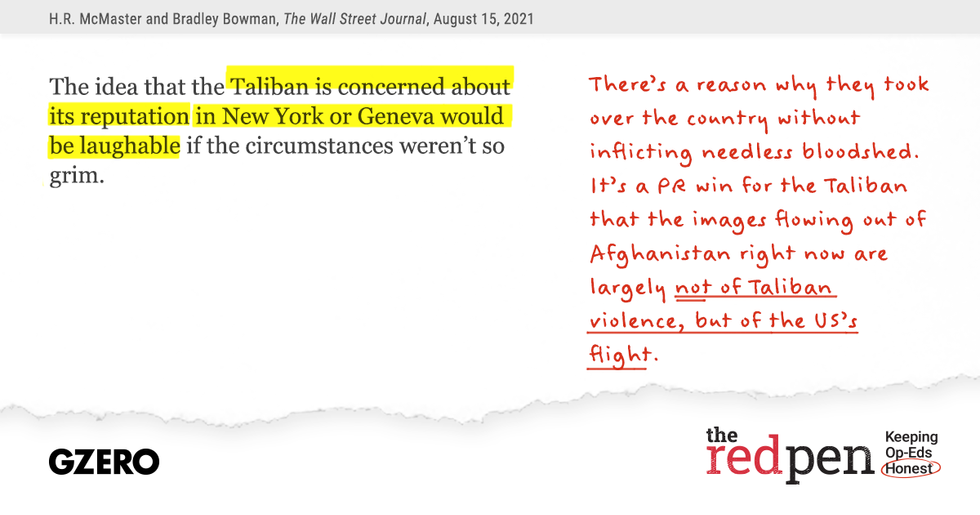
Point three, the authors point out that while Washington pundits said that there was "no military solution" in Afghanistan, the "Taliban seem to have come up with one."
So there was no Americanmilitary solution in Afghanistan: The Americans were never going to dismantle the Taliban fully, just as they couldn't dismantle the Viet Cong fully 50 years ago. And just as the Viet Cong were prepared to wait out the Americans for as long as needed, and defeat inept native forces after Washington withdrew, so was the Taliban. The US needed complete victory, which it couldn't achieve. The Taliban just needed to hold on. And it's also very early to say that the Taliban's victory over the Americans means they are going to be able to hold onto the country, especially given that most of the Afghan budget was US aid, and that's now gone.
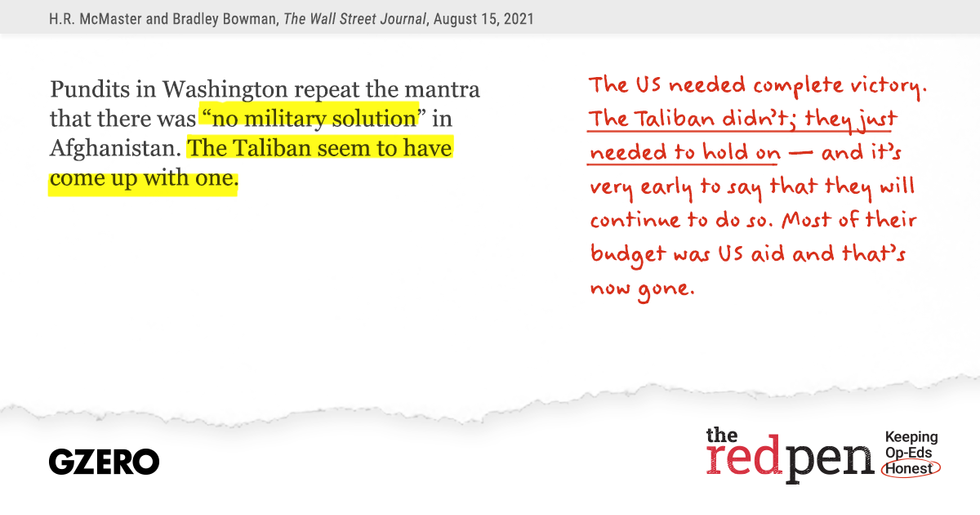
Point four, McMaster and Bowman also argue that the unfolding "humanitarian catastrophe" in Afghanistan "emboldens China, Russia and other adversaries eager to proclaim the United States an unreliable partner and a declining power."
In fact, the US withdrawal from Afghanistan, which borders China, is going to be a headache for Beijing, because they need stability in the broader Middle East to ensure a reliable supply of energy and expand the reach of its Belt and Road initiative. They are not happy that the Americans left. In fact, that's why Chinese diplomats and state media are castigating the US's exit as "hasty and irresponsible". Much better for the Chinese to have the Americans providing some level of stability and paying for it in blood and treasure. And while the Russians certainly are painting the US as unreliable and are happy for more chaos in the region, this is in my view more similar to Ukraine and Georgia, where the United States didn't have strong national interests. And so, as a consequence, ultimately chose not to defend friendly governments when they were invaded. Washington's closest partners know differently. So, I don't believe that Taiwan and Japan are fundamentally changing their calculus of national interests with the United States on the basis of what they've just seen in Kabul. The real problem for American credibility is that the Americans made the decision to leave alone. They didn't in the Afghan policy review, bring the allies that they fought side by side with for 20 years now, into the conversation at all. That's why the Europeans, in particular, are so upset and that's why they are likely to see the Americans, going forward, as more unreliable. It's a process, it's not a decision.
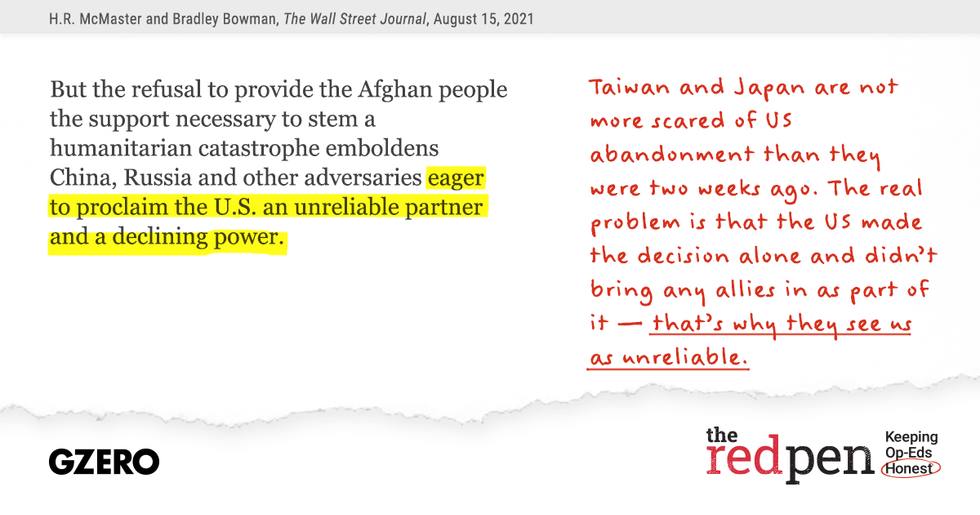
Finally, the authors conclude by suggesting that the United States "should begin the painstaking work of mitigating the humanitarian and security catastrophe" because "jihadist terror in Afghanistan won't stay in Afghanistan."
We all want to mitigate Afghan suffering, but I need to know what exactly is this "work"? Is it sending forces back in? Is it providing money to the same civil society groups the Taliban is about to destroy? Is it covert intervention? These are vague talking points but they are not real policy solutions. Without an additional surge, which is politically impossible, the Afghan government was always going to fall. Following the same playbook that failed over the last 20 years is not a reasonable option.
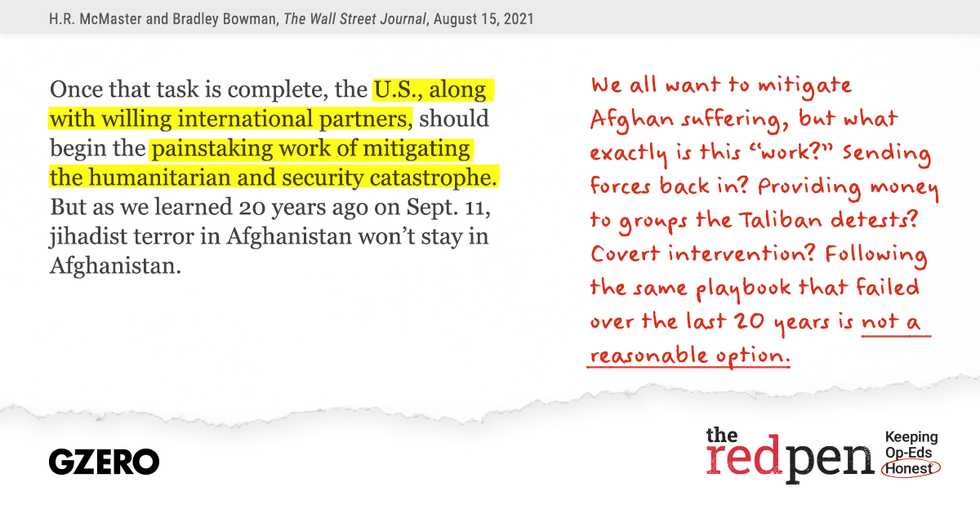
So, there you have it. That's your Red Pen on this very busy, very upsetting news week. As the situation in Afghanistan unfolds, we'll be sure to bring you ongoing analysis, and we'll also be taking a look at state of the war on terror as we approach the 20th anniversary of the 9/11 attacks. You can be sure the Taliban will be doing that on the ground in Kabul.
